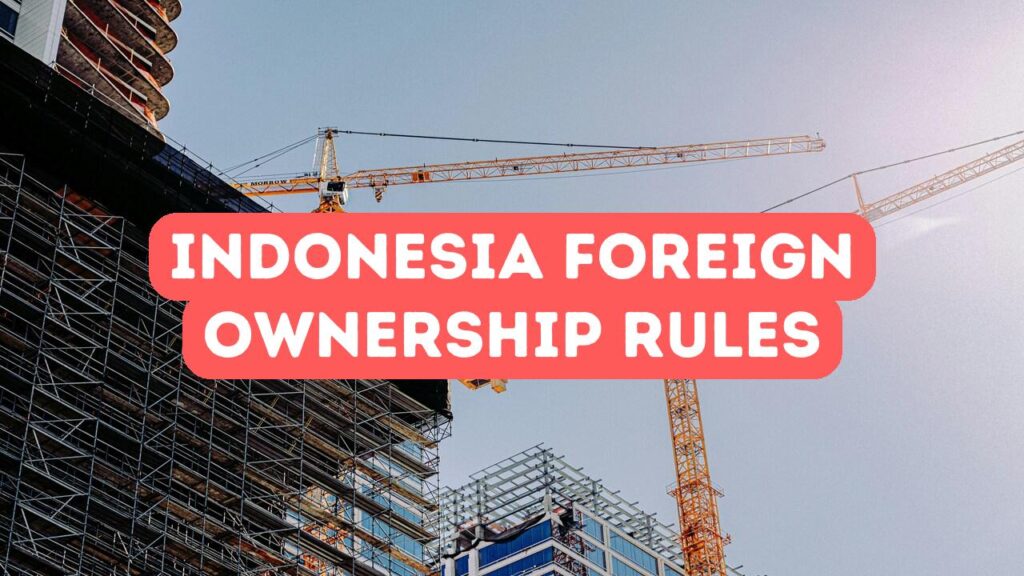Foreigners often dream of dipping their toes into the real estate Indonesia market. The allure of idyllic beaches and vibrant cities is hard to resist. But before diving in, understanding the property ownership Indonesia landscape is crucial. The foreign ownership rules are like a maze, impacting how you approach buying property Indonesia. It’s important for foreign investors Indonesia to grasp these rules to ensure a smooth property transaction. Mistakes can lead to costly delays or even losing investment opportunities. Indonesia sets clear lines on what’s allowed, and staying informed can help you navigate with confidence. So, how can foreign investors manage to secure their slice of paradise? This guide will unfold the essential strings attached to foreign ownership in Indonesia. By getting acquainted with these rules, prospective buyers can confidently step into Indonesia’s property market, ensuring their investments remain secure and fruitful.
Navigating the Legal Landscape of Foreign Property Ownership in Indonesia
Navigating the legal landscape of property ownership Indonesia can feel like walking a tightrope, especially with the complex foreign ownership rules that come into play. Foreign investors Indonesia must first understand that direct ownership of land by foreigners isn’t permitted. Instead, property ownership in Indonesia often requires navigating the laws that allow for leasing rights. This involves acquiring a “right to use” or a “right to build,” which grants the ability to utilize the land for a specific period. Buying property Indonesia under these guidelines ensures safety and legality. Furthermore, the real estate Indonesia market offers opportunities through local companies, enabling indirect property ownership. By exploring these routes, foreign investors can effectively secure and protect their investments in this picturesque yet intricate market. Understanding these foundational rules is essential to successfully owning a piece of paradise in Indonesia.
One crucial aspect of the property ownership Indonesia journey is understanding the intricate permissions required for foreign ownership. Foreign ownership rules stipulate that foreign investors Indonesia must often work through an Indonesian nominee to acquire property, adding layers of complexity to the transaction. The nominee holds the ownership on behalf of the foreigner, but creates agreements that secure the investment. This approach is common in the real estate Indonesia sphere and is pivotal in safely buying property Indonesia. Additionally, engaging with local legal experts can offer clarity and safeguard interests, ensuring compliance with Indonesian laws. Without such measures, the risk of legal complications rises considerably. It’s a terrain dotted with legal checkpoints, where each move must be calculated. However, with diligence and the right partnerships, foreign investors can successfully navigate this landscape, paving the way to owning property in the stunning locales of Indonesia.
Engaging with real estate Indonesia experts can unravel the labyrinth of foreign ownership rules, offering foreign investors Indonesia the essential guidance they need. These experts often provide insights into contracts, taxes, and legal documentation, ensuring every step aligns with Indonesian legislation. The process of buying property Indonesia becomes less daunting, as seasoned professionals illuminate potential pitfalls and showcase best practices. Moreover, maintaining transparency in dealings can foster trust and security in investments. Leveraging local expertise not only mitigates risks but also enhances understanding of Indonesia’s vibrant market dynamics. Remember, while the path to owning a piece of the Indonesian dream might be complex, it’s certainly navigable with the right allies. Building a network of knowledgeable contacts is crucial, enabling foreign investors Indonesia to transition from prospective buyers to proud property owners.
Key Regulations and Restrictions for Foreign Investors
Foreign investors Indonesia seeking to enter the property ownership Indonesia market must first understand the foreign ownership rules in place. The Indonesian government imposes specific regulations to control how foreigners can engage in real estate Indonesia transactions. First off, buying property Indonesia directly in your name is not permitted for non-Indonesian nationals. Instead, foreigners can hold usage rights, known as Hak Pakai, which allows them to lease property for an extended period. This right can be extended, but does not equate to full ownership as locals experience. Moreover, commercial endeavors demand even more careful navigation of the regulations, as gaining usage rights for business purposes involves additional criteria and governmental approvals. Ensuring compliance with these rules doesn’t just safeguard your investment but also paves the way for a rewarding venture into the bustling real estate Indonesia scene.
Foreign investors Indonesia face a tapestry of regulations when considering buying property Indonesia. Under foreign ownership rules, foreigners can secure real estate Indonesia through a nominee arrangement or by establishing a foreign-owned company (PT PMA). Each option comes with its own set of hurdles. A nominee arrangement involves partnering with a trusted local, but this requires written agreements to safeguard your interests. It’s a tightrope walk that necessitates a deep understanding of legal frameworks. On the other hand, establishing a PT PMA can be complex and time-consuming, requiring significant capital and compliance with strict business regulations. This method, however, allows for direct ownership under the enterprise’s name, offering greater security. Like a chess game, successful navigation demands strategic planning, patience, and due diligence. With the right approach, foreign investors Indonesia can confidently dance through Indonesia’s real estate Indonesia landscape while safeguarding their interests.
Property ownership Indonesia rules cast a net of limitations, primarily through two legislative elements—Hak Pakai usage rights and Hak Milik property rights. Under foreign ownership rules, foreigners are granted Hak Pakai, a legal path enabling property use but not outright ownership as experienced by citizens. This simulated ownership poses advantages like renewable leases, yet doesn’t equate to the full array of property rights. Real estate Indonesia requires that foreign investors Indonesia adhere strictly to law, which prohibits them from acquiring Hak Milik. Moreover, purchasing land or property through partnerships or nominee agreements is fraught with pitfalls unless managed with conspicuous legal diligence. Buying property Indonesia thus involves dodging numerous legislative hurdles to ensure compliance and protect investments. Overseas investors must remain vigilant, weaving through these restrictions to avoid potential snags and secure long-term prospects. By intimately understanding these provisions, foreign investors can effectively maneuver within the real estate Indonesia sphere.
Strategies for Successfully Acquiring Indonesian Real Estate as a Foreigner
Acquiring real estate Indonesia as a foreigner requires not just enthusiasm but a well-laid plan. It’s a bit like preparing for a challenging hike; without a map, you might get lost. First and foremost, understanding foreign ownership rules is key. These guidelines dictate what, how, and how much you can buy. Typically, foreigners can only hold property under specific titles, and knowing these inside out saves time and drama. Many foreign investors Indonesia find it beneficial to partner with local experts who can illuminate the path forward. This combination of local insight and foreign ambition truly opens doors in the property ownership Indonesia landscape. Moreover, establishing a solid relationship with a reputable notary ensures that the buying property Indonesia process goes off without a glitch. In this game, knowledge is power, and the better informed you are, the smoother your journey towards owning a piece of Indonesian paradise.
Keep your strategy as sharp as a tack. A common route for foreign investors Indonesia is securing a long-term lease. The leasehold option aligns perfectly with the foreign ownership rules while giving you access to a variety of prime properties. It’s like having your cake and eating it too. Alternatively, setting up a local entity or PT PMA unlocks broader opportunities in the real estate Indonesia sector. Engaging a local partner can be the secret sauce to navigating these complexities. Often, foreign investors Indonesia capitalize on tying the knot with a credible legal advisor to steer through regulations. Comprehending the nuances of buying property Indonesia isn’t just crucial—it’s imperative. Research, network, and due diligence serve as the trusty map on this journey, leading you towards a seamless property ownership Indonesia experience. Always keep your eye on the prize and stay one step ahead by mastering these strategies.
Buying property Indonesia can sometimes feel like trying to untie a knot with one hand tied behind your back. Yet, with the right strategies, foreign investors Indonesia can secure prime real estate Indonesia. A wise move is diving deep into market research. It’s akin to fishing, where patience and knowledge of the best spots yield the biggest catch. Foreign ownership rules in Indonesia set specific limitations, but understanding them lets you maneuver smartly. Engaging a team of local legal advisors familiar with the intricacies and potential pitfalls of property ownership Indonesia is invaluable. Furthermore, many seasoned investors establish a local partnership to streamline processes and build strong ties within the market. Due diligence isn’t merely a checklist; it’s your compass pointing towards a successful acquisition. By mastering these strategies, the dream of owning a piece of this tropical paradise turns from distant possibility into exciting reality.
Disclaimer: This article is for general informational purposes only and you are strongly advised to consult a professional to evaluate your personal situation. No liability is accepted that may arise from the use of the information in this article.







